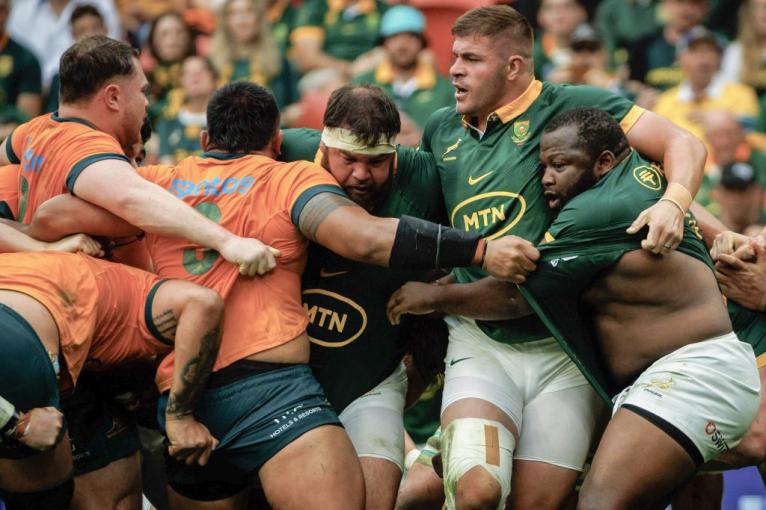
[ad_1]
It’s one of the weirdest things in all of sport. Sixteen players, more than half the active participants, coalesce into two masses of humanity to shove each other over an oval ball.
Just about anyone can add their weight at the back or on the side, but those at the pointy end, where bleeding forehead meets cauliflowered ear, only a select few can do this job.
“I could have played in Jason Robinson’s position, but I’d have been really s**t,” says David Flatman, one of the game’s most influential commentators who propped up the scrum in over 260 club matches and eight Tests for England. “But if Jason Robinson played in my position he’d have been really dead.”
Former England prop David Flatman is now a respected and admired pundit for various outlets (Photo by Alex Davidson – RFU/The RFU Collection via Getty Images)
Every footballer, even goalkeepers, must know how to kick a ball with their feet. Specialist bowlers in cricket must hold a bat on occasion. But anchoring the scrum? Some of the greatest players in rugby’s 153-year history have never had the experience. What’s more, they would have likely turned down the invitation if it ever came their way.
“It takes a special sort to do it,” says Adam Jones, the former Wales and British and Irish Lions prop who now works as Harlequins’ scrum coach after an 18-year playing career. If there’s anyone who knows a thing or two about this nasty business, it’s him.
Which in a way makes him a druid of sorts, a keeper of some arcane lore passed down to only a select few. It’s not just the hair and rosy cheeks, though his appearance certainly underlines his status as a wizard. As he says, “Not many people know what goes on in the scrums so it’s got a bit of mystery to it.
Imagine I was solo-commentating on a Premiership game and there was a line-break in midfield and I just said, ‘No-one knows what goes on the backline’. I’d get roasted! I’d be out of a job!
“It’s quite cool having this knowledge. It does give you a certain credibility. But to be honest I wish more people knew about it. Things are changing. More people are at least trying to understand why penalties are given and why some teams manage to get dominance more often than others. But historically there’s been this general ignorance.”
Flatman picks up the angle: “It’s not just ignorance, it’s accepted ignorance. I can’t tell you how many times I’ve heard a commentator say something like, ‘No-one knows what’s going on in there’, or, ‘I have no idea why the ref blew that. It drives me mad!
“Imagine I was solo-commentating on a Premiership game and there was a line-break in midfield and I just said, ‘No-one knows what goes on the backline’. I’d get roasted! I’d be out of a job! There’s this widespread acceptance that not knowing about one of the game’s most important parts is somehow okay when it really isn’t, especially from people who are paid to explain what’s going on. If you don’t know, then you should learn.”
However, both Jones and Flatman agree that things are shifting on this front. Some fans might still use the formation of a scrum to put the kettle on or share their thoughts on social media, but more and more casual observers are starting to acquire the taste for these monumental collisions.
 South Africa’s feared and fabled Bomb Squad has been central to their back-to-back Rugby World Cup triumphs (Photo by PATRICK HAMILTON/AFP /AFP via Getty Images)
South Africa’s feared and fabled Bomb Squad has been central to their back-to-back Rugby World Cup triumphs (Photo by PATRICK HAMILTON/AFP /AFP via Getty Images)
“It’s my favourite thing in the world,” says the aptly named Tank Lanning, a respected coach in South Africa’s Western Cape who divides his time between braaing eye-watering volumes of meat and educating school kids in the ways of this sacred craft.
“It’s my life’s work and it genuinely feels like we’re in a bit of a golden period. I coach Under-11 boys and they come up to me at practice and say, “Sir, Sir, Sir, did you see how Kitsy [Steven Kitshoff] worked out that tighthead?’, or, ‘Sir, don’t you think that Ox [Nche] should start?’.
“Most of these kids only watch rugby on short TikTok videos but I suppose the fact scrums are now included in these highlights packages, these kids actually think scrums are cool, is a sign that things are changing.”
Much of this has to do with the personalities involved. Speaking on the Love of Rugby podcast, host Dan Cole, in conversation with his fellow England prop, Joe Marler, offered his thoughts on what makes someone want to put their body through such torment.
When I first started around 2000, I had ex-players telling me, and telling my mates, that I was this fat short boy with stupid curls who didn’t belong on a rugby pitch.
“To play in the front row you have to have a certain mentality,” Cole began. “It’s not the most pleasant of places at times… You’re also probably, throughout the years, the fat ones in the team, the slow ones, you have to find a way to laugh at yourself. You’re the unathletic one that doesn’t keep up with fitness. You have to have a certain ability to laugh at yourself.”
Marler, giggling that trademark giggle, concurred: “It unites us. There’s always something about them that’s a little quirky. Whether it’s an extrovert or introvert, they’ll still always be a little weird, in a good way.”
In a game constantly told it lacks characters, those shorter, rounder chaps with thoraces that don’t move and necks buried in bulging traps are now among its popular members. Marler is up there as one of rugby’s most instantly recognisable figures due to his mohawk, tattoos and social media presence. Andrew Porter, who is similarly inked, provided one of the most memorable storylines in the Netflix series Full Contact. Ox Nche is perhaps the most quoted rugby player of all time after he declared ‘salads don’t win scrums’. One UK company is charging customers £20 for a black t-shirt with that famous mantra emblazoned on its front.
“When I first started around 2000, I had ex-players telling me, and telling my mates, that I was this fat short boy with stupid curls who didn’t belong on a rugby pitch,” recalls Jones, now widely regarded as one of the best ever to step over the white line for Wales.
 Adam Jones won three Six Nations Grand Slams and toured twice with the British and Irish Lions (Photo Stu Forster/Getty Images)
Adam Jones won three Six Nations Grand Slams and toured twice with the British and Irish Lions (Photo Stu Forster/Getty Images)
“I remember Bobby Windsor [the ‘Iron Duke’ of Welsh rugby who went on two Lions tours in the 1970s] was pretty public with his criticism. But he later said if Wales ever lost me, they’d be in trouble. That shows that it doesn’t matter what you look like or what you say. You can have any hairstyle you’d like and cover your face in tattoos if you want. But if you don’t back it up on the field you’ve got no chance. And these boys are proper players. Ox, Ellis [Genge], Joe, Porter; these are some serious players.”
Does this mean that props are starting to get their dues? Flatman argues they’ve always been respected by those in the know. That those who share the field with them appreciate their donkey work. But are props and the graft they do now admired by the general public? Is it too soon to ask if props and scrums are sexy?
“The blokes who play there aren’t really to my taste, to be honest,” Flatman says. “Thankfully none of the guys we’re talking about look anything like my wife! But I do think they’re getting more respect, which is a good thing. I think more people are starting to realise it’s not just head down, arse up and push. People are starting to appreciate there’s a subtlety to what’s going on. An art, if you like.”
Intelligent props; there’s a contradiction in terms, right? Not so. Jannie du Plessis, who won a World Cup with South Africa in 2007, is a doctor working as a general practitioner back home. Jones himself once achieved a perfect score on the BBC’s Question of Sport, providing a dozen correct answers in a row.
It’s primal, it’s technical, it’s raw. It requires teamwork and precision.
“You don’t have to be book smart to play prop but you’ve got to have something between the ears,” Jones explains. “There are so many moving parts in the scrum and you’re constantly trying to figure out how to manipulate the man in front of you. People generally think props are pretty thick but I’d say they’re often the most intelligent in the team.”
The world has indeed changed. Young children are tearing down posters of fly-haves and wingers and replacing them with images of burly men. Tightheads are among the best paid players in the world. Props are hosting podcasts and displaying their sensitive sides for tell-all documentaries.
“There’s scope for them to be heroes,” Flatman says. “They’re winning games for their countries and dictating how the rest of the team plays,” adds Flatman.
All three of the scrum-loving men interviewed for this story are conscious the game is changing, but not all for the better. The scrum, as they all see it, is in danger of being depowered in pursuit of faster ball-in-play time. Naturally, they’d rather those with their hands on the levers of power leave it alone.
“It’s a thing of beauty,” Jones says with a lyrical lilt, as an art aficionado might speak of a Rembrandt or Klimt. “It’s primal, it’s technical, it’s raw. It requires teamwork and precision. You’ve got to be accurate and there’s an element of danger in there as well. It’s everything we love about rugby distilled in this one moment. I can’t see how you can call yourself a fan of the game and not be in love with the scrum.”
[ad_2]
Copyright for syndicated content belongs to the linked Source link

